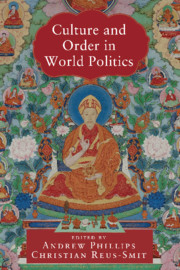Book contents
- Culture and Order in World Politics
- LSE International Studies
- Culture and Order in World Politics
- Copyright page
- Contents
- Additional material
- Contributors
- Preface
- Part I Introduction
- Part II Historical Orders
- Part III The Modern ‘Liberal’ Order
- Part IV Constitution and Contestation
- 10 Universal and European
- 11 The Jewish Problem in International Society
- 12 Recognizing Diversity
- 13 Gender, Nation and the Generation of Cultural Difference across ‘The West’
- 14 Governing Culture ‘Credibly’
- Part V Conclusion
- References
- Index
14 - Governing Culture ‘Credibly’
Contestation in the World Heritage Regime
from Part IV - Constitution and Contestation
Published online by Cambridge University Press: 25 December 2019
- Culture and Order in World Politics
- LSE International Studies
- Culture and Order in World Politics
- Copyright page
- Contents
- Additional material
- Contributors
- Preface
- Part I Introduction
- Part II Historical Orders
- Part III The Modern ‘Liberal’ Order
- Part IV Constitution and Contestation
- 10 Universal and European
- 11 The Jewish Problem in International Society
- 12 Recognizing Diversity
- 13 Gender, Nation and the Generation of Cultural Difference across ‘The West’
- 14 Governing Culture ‘Credibly’
- Part V Conclusion
- References
- Index
Summary
UNESCO’s world heritage regime was founded in 1972 to identify and protect cultural and natural sites of 'outstanding universal value,' which constitute humanity’s common heritage. The identification and proper valuation of these sites, it was hoped, would interpellate a common humanity and foster identification with this humanity, thereby contributing to peaceful global relations. This chapter argues that the world heritage regime is a diversity regime that curates the world’s cultural diversity as part of world order-making. In turn, the changes in the world order since the regime’s establishment have resulted in challenges to the regime’s governance of culture based on a universal value and through scientific-technical evaluation by international experts. These challenges have resulted in increased resistance to international experts, the demand for the inclusion of local experts, and in two (competing) conceptions of credibility as scientific-technical adjudication and as representativity.
Keywords
- Type
- Chapter
- Information
- Culture and Order in World Politics , pp. 294 - 316Publisher: Cambridge University PressPrint publication year: 2020

